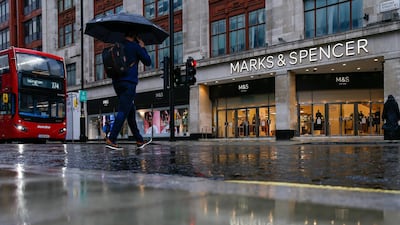Britain's Marks & Spencer swung to a first-half pre-tax loss of £87.6 million ($113.43), its first, as Covid-19 hit clothing and homeware sales.
The retail chain’s loss for the six months ended September 26 was its first since 1926, when it became a publicly listed company, and contrasts sharply with the £158.8m pre-tax profit seen in the same period last year. Revenue fell almost 16 per cent to £4.09bn, with an adjusted loss of £17.4m.
However, chief executive Steve Rowe was upbeat: “In a year when it has become impossible to forecast with any degree of accuracy, our performance has been much more robust than at first seemed possible.
“But out of adversity comes opportunity and, through our Never the Same Again programme, we have brought forward three years change in one to become a leaner, faster and more digital business.”
Retailers were hit hard at the start of the pandemic when the country went into lockdown and non-essential stores were closed. While UK retail sales rebounded for the fifth consecutive month in September, a second lockdown will hurt the sector once again when stores shut up shop on Thursday.
In August, M&S said it would cut 7,000 jobs over three months and the company is also closing 100 stores as it tackles the high-street downturn.
Sales for the group slid 15.8 per cent to £4.09bn, outperforming the company’s Covid-19 expectations of a 22.8-per-cent decline.
“As a result, the group exited the period with reduced stock levels year-on-year and generated free cash flow,” the company said in a statement.
The company’s food business performed strongly, achieving 2.7 per cent growth as its new partnership with British online supermarket Ocado helped to offset some of the effects of store closures.
However, clothing and home sales declined 40.8 per cent, with a fall of 21.3 per cent in the second quarter after a first-quarter decline of 61.5 per cent.
The firm attributed the falling sales to the first lockdown earlier this year when shops were closed and a demand for more casual clothes over office wear. Social distancing was also a factor, it said, as customers couldn’t try clothes on in store.
After stores reopened, the company said it still faced “substantial headwinds,” with city centre stores recording a 55-per-cent decline in clothing sales between July and September.
However, the company expects demand for occasion and formal attire to return once the recovery begin and events return.
Looking at its international franchises, M&S, which has 18 stores in the UAE in partnership with Al-Futtaim, said its international revenue declined 25.5 per cent, reflecting the “impact of lockdowns in multiple geographies in quarter one, peaking with the closure of 84 per cent of all international stores and progressive reopening in quarter two”.
“These impacts were partly offset by an international online sales increase of 75.4 per cent,” the company said.
Adam Vettese, analyst at multi-asset investment platform eToro, said M&S's revenue came in better than expected "given that the first lockdown butchered sales".
"It managed to reduce its debts, its cash levels are good and its joint venture with Ocado is making impressive progress,” he said.
“Forecasters at Springboard are predicting a 62 per cent fall in footfall in the run-up to the Christmas period, which would cap off a pretty miserable year for the retail sector. That may be enough to tip Marks to the second loss in its history, but it has shown enough resilience in recent months to suggest it can make it through this crisis quite comfortably.”
M&S is lobbying the UK government for Sunday store trading hours to be extended next month to help make up for lost trade in November's lockdown, Mr Rowe said.
"We are lobbying quite hard with the rest of the industry for the extension and de-regulation of some Sunday hours, particularly as we get closer to Christmas," he said.
On Tuesday clothing retailer Primark also called for December hours to be extended.


